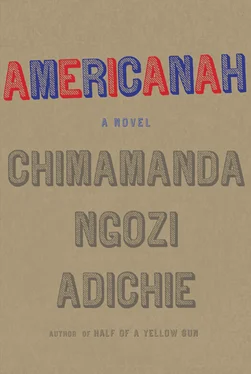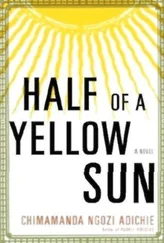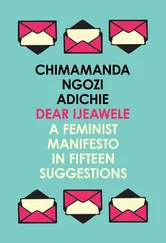“Good evening, sir,” Obinze said. It surprised him that Chief was something of a fop, with his air of fussy grooming: nails manicured and shiny, black velvet slippers at his feet, a diamond cross around his neck. He had expected a larger man and a rougher exterior.
“Sit down. What can I offer you?”
Big Men and Big Women, Obinze would later learn, did not talk to people, they instead talked at people, and that evening Chief had talked and talked, pontificating about politics, while his guests crowed, “Exactly! You are correct, Chief! Thank you!” They were wearing the uniform of the Lagos youngish and wealthyish — leather slippers, jeans and open-neck tight shirts, all with familiar designer logos — but there was, in their manner, the plowing eagerness of men in need.
After his guests left, Chief turned to Nneoma. “Do you know that song ‘No One Knows Tomorrow’?” Then he proceeded to sing the song with childish gusto. No one knows tomorrow! To-mor-row! No one knows tomorrow! Another generous splash of cognac in his glass. “That is the one principle that this country is based on. The major principle. No one knows tomorrow. Remember those big bankers during Abacha’s government? They thought they owned this country, and the next thing they knew, they were in prison. Look at that pauper who could not pay his rent before, then Babangida gave him an oil well, and now he has a private jet!” Chief spoke with a triumphant tone, mundane observations delivered as grand discoveries, while Nneoma listened and smiled and agreed. Her animation was exaggerated, as though a bigger smile and a quicker laugh, each ego-burnish shinier than the last, would ensure that Chief would help them. Obinze was amused by how obvious it seemed, how frank she was in her flirtations. But Chief merely gave them a case of red wine as a gift, and said vaguely to Obinze, “Come and see me next week.”
Obinze visited Chief the next week and then the next; Nneoma told him to just keep hanging around until Chief did something for him. Chief’s steward always served fresh pepper soup, deeply flavorful pieces of fish in a broth that made Obinze’s nose run, cleared his head, and somehow unclogged the future and filled him with hope, so that he sat contentedly, listening to Chief and his guests. They fascinated him, the unsubtle cowering of the almost rich in the presence of the rich, and the rich in the presence of the very rich; to have money, it seemed, was to be consumed by money. Obinze felt repulsion and longing; he pitied them, but he also imagined being like them. One day, Chief drank more cognac than usual, and talked haphazardly about people stabbing you in the back and small boys growing tails and ungrateful fools suddenly thinking they were sharp. Obinze was not sure what exactly had happened, but somebody had upset Chief, a gap had opened, and as soon as they were alone, he said, “Chief, if there is something I can help you do, please tell me. You can depend on me.” His own words surprised him. He had stepped out of himself. He was high on pepper soup. This was what it meant to hustle. He was in Lagos and he had to hustle.
Chief looked at him, a long, shrewd look. “We need more people like you in this country. People from good families, with good home training. You are a gentleman, I see it in your eyes. And your mother is a professor. It is not easy.”
Obinze half smiled, to seem humble in the face of this odd praise.
“You are hungry and honest, that is very rare in this country. Is that not so?” Chief asked.
“Yes,” Obinze said, even though he was not sure whether he was agreeing about his having this quality or about the rarity of this quality. But it did not matter, because Chief sounded certain.
“Everybody is hungry in this country, even the rich men are hungry, but nobody is honest.”
Obinze nodded, and Chief gave him another long look, before silently turning back to his cognac. On his next visit, Chief was his usual garrulous self.
“I was Babangida’s friend. I was Abacha’s friend. Now that the military has gone, Obasanjo is my friend,” he said. “Do you know why? Is it because I am stupid?”
“Of course not, Chief,” Obinze said.
“They said the National Farm Support Corporation is bankrupt and they’re going to privatize it. Do you know this? No. How do I know this? Because I have friends. By the time you know it, I would have taken a position and I would have benefited from the arbitrage. That is our free market!” Chief laughed. “The corporation was set up in the sixties and it owns property everywhere. The houses are all rotten and termites are eating the roofs. But they are selling them. I’m going to buy seven properties for five million each. You know what they are listed for in the books? One million. You know what the real worth is? Fifty million.” Chief paused to stare at one of his ringing cell phones — four were placed on the table next to him — and then ignored it and leaned back on the sofa. “I need somebody to front this deal.”
“Yes, sir, I can do that,” Obinze said.
Later, Nneoma sat on her bed, excited for him, giving him advice while smacking her head from time to time; her scalp was itchy beneath her weave and this was the closest she could come to scratching.
“This is your opportunity! The Zed, shine your eyes! They call it a big-big name, evaluation consulting, but it is not difficult. You undervalue the properties and make sure it looks as if you are following due process. You acquire the property, sell off half to pay your purchase price, and you are in business! You’ll register your own company. Next thing, you’ll build a house in Lekki and buy some cars and ask our hometown to give you some titles and your friends to put congratulatory messages in the newspapers for you and before you know, any bank you walk into, they will want to package a loan immediately and give it to you, because they think you no longer need the money! And after you register your own company, you must find a white man. Find one of your white friends in England. Tell everybody he is your General Manager. You will see how doors will open for you because you have an oyinbo General Manager. Even Chief has some white men that he brings in for show when he needs them. That is how Nigeria works. I’m telling you.”
And it was, indeed, how it worked and still worked for Obinze. The ease of it had dazed him. The first time he took his offer letter to the bank, he had felt surreal saying “fifty” and “fifty-five” and leaving out the “million” because there was no need to state the obvious. It had startled him, too, how easy many other things became, how even just the semblance of wealth oiled his paths. He had only to drive to a gate in his BMW and the gatemen would salute and open it for him, without asking questions. Even the American embassy was different. He had been refused a visa years ago, when he was newly graduated and drunk with American ambitions, but with his new bank statements, he easily got a visa. On his first trip, at the airport in Atlanta, the immigration officer was chatty and warm, asking him, “So how much cash you got?” When Obinze said he didn’t have much, the man looked surprised. “I see Nigerians like you declaring thousands and thousands of dollars all the time.”
This was what he now was, the kind of Nigerian expected to declare a lot of cash at the airport. It brought to him a disorienting strangeness, because his mind had not changed at the same pace as his life, and he felt a hollow space between himself and the person he was supposed to be.
He still did not understand why Chief had decided to help him, to use him while overlooking, even encouraging, the astonishing collateral benefits. There was, after all, a trail of prostrating visitors to Chief’s house, relatives and friends bringing other relatives and friends, their pockets full of requests and appeals. He sometimes wondered if Chief would one day ask something of him, the hungry and honest boy he had made big, and in his more melodramatic moments, he imagined Chief asking him to organize an assassination.
Читать дальше












